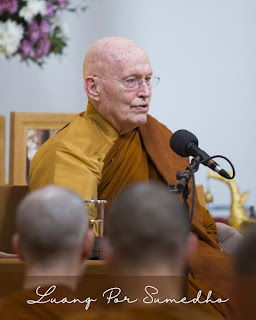The aim of Buddhist meditation is to let go of these conditions of the mind, which doesn't mean denying, or getting rid of, or judging them. It means not believing them or following them; instead we listen to them as Dhamma, as conditions of the mind that arise and cease.With an attitude of awakened, attentive awareness, we learn to trust in ...just being the listener, the watcher, rather than being somebody trying to meditate to get some kind of result.
If we try to think about meditation practice as this or that, we're creating an image that we're trying to realise, rather than just trusting in the attentiveness of the mind, in mindfulness; letting go of the desire to find or grasp anything. As soon as we think about ourselves, we become a person - somebody - but when we are not thinking, the mind is quite empty and there is no sense of person. There is still consciousness, sensitivity, but it's not seen in terms of being a person, of being a man or a woman; there is just awareness of what is happening - what the feeling is, the mood, the atmosphere that one is experiencing in this moment. We can call this intuitive awareness. It is not programmed and conditioned by thought or memory or perception.
We are renouncing, abandoning, letting go of things. To the worldly mind, it might sound as though we're getting rid of something, or condemning the sense world, the pleasures and the beauty that we can all experience as human beings; rejecting it, because we see it as evil or wrong. But renunciation isn't a moral judgement against anything.
Rather, it's a moving away from that which complicates and makes life difficult, towards the ultimate simplicity of pure mindfulness in the present moment; because enlightenment is here and now, the Truth is now. There is not anyone who can become anything, there is not anyone who is born or who will die - there is only this eternal now. This awareness is what we can tune into, as we let go of the appearances and the habitual tendencies.
When we emphasise our personality we create problems, because the personal qualities are different for each one of us. We have our common human problems: old age, sickness and death; all men have certain things in common; all women have certain conditions in common. But then there are certain attitudes, cultural expectations and assumptions, which are conditioned into the mind, instilled into us after we are born. Through mindfulness, we are able to get beyond this conditioning of the mind to the pure consciousness that isn't conditioned, but which is like the background, the emptiness, the blank sheet on which words are written. Our perceptions arise and cease on that blank sheet, that emptiness.
The personality, the self-consciousness, the fears and the desires of the mind are what they are; we are not trying to dismiss them or add to them, or make any problems or difficulties around them. We are willing to let them be what they are.
They feel this way, they have this quality; they arise and cease. In that cessation there's the realisation of the peace, the bliss or the serenity of being, and there's no self in it.
Everyone has that potential, that ability to realise this. We describe it as seeing the Dhamma, the way it is - it's not a matter of becoming anything at all.
Ajahn Sumedho.
Consciousness, thus unestablished, not proliferating, not performing any function, is released. Owing to its release, it stands still. Owing to its stillness, it is contented. Owing to its contentment, it is not agitated.
Not agitated, he (the monk) is totally unbound right within. He discerns that 'Birth is ended, the holy life fulfilled, the task done. There is nothing further for this world.'
"For one knowing in this way, seeing in this way, monk, there is the immediate ending of fermentations."
SN22.55

No comments:
Post a Comment